‘Ticha Umbaratha’ making rounds at Film Festivals
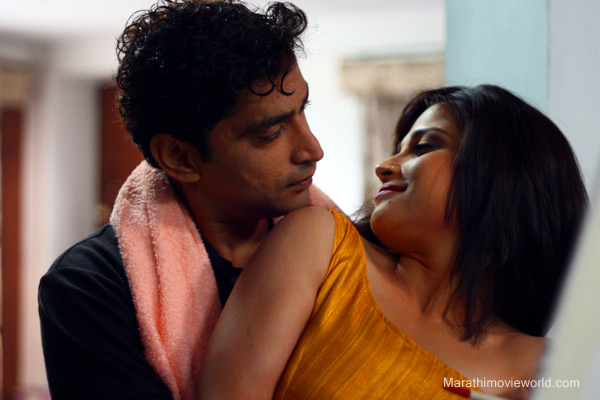
Many Marathi films are receiving good response at film festivals. In fact, it has become a trend to first do the rounds of numerous National and International film festivals, get recognition and then release the film commercially. While doing so, these film makers use the laurels and awards received, during the promotions of their film.
While still unreleased ‘Court‘ is busy with film festivals, one more Marathi film ‘Ticha Umbaratha’ is also doing the rounds, at film festivals. This film has been produced under the banner RDX Cinema by bollywood action director Ravi Dewan and directed by Pradeep Ghonsikar. It was honoured with Best Cinema Today award at PIFF (Pune International Film Festival) and has also won couple of awards, including the best actress award (Tejaswini Pandit) at Sangli International Film Festival. It has also bagged five nominations at one of the TV channels’ awards.
‘Ticha Umbaratha’ is about trials and tribulations of an urban middle class house-wife, who is forced to cross her limits at one point of time in life; and how she fights it without compromising on her values. The story is by Jayant Pawar and bollywood’s renowned cinematographer Yogesh Jani is behind the camera. The cast includes Chinmay Mandlekar, Tejaswini Pandit, Jyoti Chandekar, Suyash Tilak among others. As this film is busy with film festivals, the release date has still not been finalised.
‘Lokmanya-Ek Yugpurush’ is an ideal and timely gift for the new year
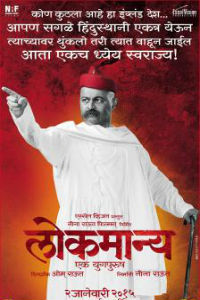 Rating: ★★★ ½
Genres: Drama Censor: U/A Duration: 120 mins Studio/presenter: Neena Raut Films, Emmay Entertainment Producer: Neena Raut Director: Om Raut Writer: Om Raut, Kaustubh Savarkar Lyrics: na Music: Ajit-Sameer Cinematographer (DOP): Prasad Bhende Cast: Subodh Bhave, Sameer Vidwans, Chinmay Mandlekar, Priya Bapat Kamat Movie Review by: Keertikumar Kadam |
Through our school text books, we have learned that Lokmanya Bal Gangadhar Tilak , led India’s freedom struggle . A committed Journalist, Teacher, Social Reformer, Lawyer, and a dynamic freedom fighter; he was all in one.
Presented by Essel Vision and produced under the banner of Neena Raut Films ‘Lokmanya, Ek Yugpurush’ is a latest Marathi movie, which reminds the thoughts of late Bal Gangadhar Tilak. The movie comments on the socio-political situation in India today, with a Voiceover narration in the beginning of the movie, by Nana Patekar in his typical style. The movie starts with a court scene, where Tilak is being tried and then goes into flashback, to unfold the life and times of Lokmanya Tilak.
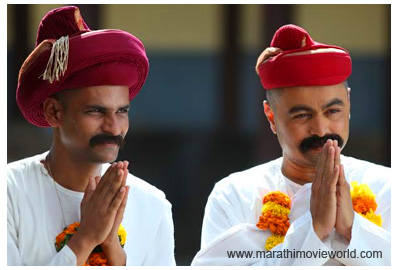
So, we find Tilak (Subodh Bhave) returning from Bombay after studying law degree , only to start a school for the local people, with the help of his friend, Agarkar (Sameer Vidwans). Both manage to open New English School. The movie has shown two eras, one being the film’s subject era and the other being today’s time. However, both relate to each other. Makarand ( Chinmay Mandlekar) is a young journalist, who gets fascinated by Tilak’s thinking, after reading books on him, but in the process, ignoring his would be wife- Samira (Priya Bapat Kamat). He becomes more and more idealistic, with the thoughts of Tilak- like, “Swarajya mhanje swakiyanche rajya!”
The film has shown the ruthless ways of British officer Rand , to deal ‘plague’, which hit Poona, during his time. Then, the officer being killed by Damodar Hari Chaphekar with the knowledge of Tilak, is also shown skilfully. The film also elaborates on Tilak’s hard hitting writings against the rulers and justifying Britishers’ killings through his newspaper; which lands him in jail and is sentenced to rigorous imprisonment of six years outside the country in Mandalay, Burma. (1908-1914).
Story by Om Raut & Kaustubh Savarkar is well researched. But, highlight of the movie is its screenplay and dialogues . Art direction (Santosh Phutane) and costume department (Mahesh Sherla) have complimented camera work of Prasad Bhende. Interesting lighting and camera angles add beauty to the frames. Music (Ajit-Sameer) is an asset, as the songs escalate the drama in story telling. Background music is noteworthy. Editor (Aashish Mhatre, Apurva Motivale) and the director have worked beautifully hand in glove and it shows in scene cutting.
Director (Om Raut) makes his presence felt from the very first scene onward. He has merged two time-periods in excellent fashion. Only faltering being, movie should have ended on a high note on, ” Swarajya ha maza janmasiddha hakka aahe, aani to mi milavinarch”, the line Tilak is identified with. Subodh Bhave has marvelled as Tilak. He has used his voice to greater effect with modulations depicting different emotions. Sameer Vidwans as Agarkar is very convincing. Chinmay Mandlekar has promisingly portrayed the thought process of today’s youth . He is well supported by Priya Bapat Kamat. There are many more characters played by actors. Thanks to the makers, for a very good New Year’s gift in the form of ‘Lokmanya, Ek Yugpurush’.
Moraya ( मोरया )
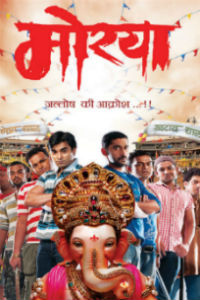
Release Year: 2011
Rating: ** 1/2
Censor: U/A
Duration: 120 mins
Producer: Atul Kamble, Avadhoot Gupte
Exe-Producer: Hemendra Kulkarni
Director: Avadhoot Gupte
Writer: Sachin Darekar
ScreenPlay: Sachin Darekar
Dialogues: Sachin Darekar
Cast & Crew
Exe-Producer: Hemendra Kulkarni
Director: Avadhoot Gupte
Writer: Sachin Darekar
ScreenPlay: Sachin Darekar
Dialogues: Sachin Darekar
Lyrics: Avadhut Gupte, Guru Thakur, Sandeep Khare, Arvind Jagtap
Music: Avadhut Gupte
Background Music: Prasad Saashate
Singers: Swapnil Bandodkar, Janhavi Arora, Dnyaneshwar Meshram, Fareed Saabri, NIrija Bhide, Avadhut Gupte
Choreography: Rajesh Bidave
Cinematography: Rahul Jadhav
Art: Shailesh Mahadik
Publicity Design: Brain On Rent
Make Up: Aamod Doshi
Editor: Faisal -Imraan
Action: Thakur
Cast: Santosh Juvekar, Chinmay Mandlekar, Dilip Prabhavalkar, Ganesh Yadav, Janardan Parab, Pushkar Kshotri, Vijay NIkam, Sunil Godse, Sunil Ranade, Vimal Mhatre, Meghana Erande, Pari Telang, Spruha Joshi, Dhanashree Kodegaonkar
Synopsis
Videos
News / Article / Interviews
Movie Still(s)
Poster(s)
Review
‘Vijay Aso’ shows the way to eliminate Bad Politicians
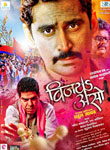 |
Rating: na
Banner: Artha Motion Pictures, Nirmit Nirmitee Producer:Chandresh Bhanushali, Shashank Kotiyan, M. K. Sundaram, Gurunath Mithbavkar Director: Rahul Jadhav. Music:Debutant Amitraj Cinematography:Rahul Jadhav Cast: Chinmay Mandlekar, Namrata Gaikwad, Ganesh Yadav, Amita Khopkar, Kedar Shinde, Janardan Parab, Priyadarshan Jadhav, Rohan Gujar, Mangesh Kawade, Vishnu Kokane. Movie Review by: Ulhas Shirke |
Many Marathi films have shown in the past, how the shrewd politicians exploit their loyal party workers and when time comes, they expect them to sacrifice even their lives for themselves. In the past, film like ‘Zenda’ showed such characters. Through many Bollywood films, we have seen the politicians finishing off their own loyal workers, after they achieve what they desired for.
New Marathi film ‘Vijay Aso’ shows the loyalty of one such young loyalist party worker Shankar Gawade (Chinmay Mandlekar), who with the help of his supporters is ready to even sacrifice his life for his Boss- the Forest Minister of Maharashtra – Mr. Prakashdada Jadhav (Murali Sharma). Prakashdada is into all illegal trade and is also involved in a scam. The media is exposing him from time to time; but Prakashdada manages to cover up the issues using his influence in ruling party.
When TV Journalist Shrikant Pathak (Ganesh Yadav) exposes Prakashdada, through a sting operation carried out on his Forest department secretary, Shankar dares to slap Shrikant in his office after damaging his office furniture, with the help of his team. In fact, Shankar plays an agent to supply people for different public rallies organized by Politicians. Journalist Shrikant is well aware of that and he also gets a clue about the dirty game planned by Prakashdada , using Shankar’s people to teach a lesson to his party chief , when he gets the news about his removal from the Ministry.
When Shankar’s people are killed in the police firing; during a rally, as per Prakashdada’s plan, Shankar boils in revenge against Prakashdada. At this moment, Shrikant comes to his rescue and saves Shankar’s life. He educates Shankar and advises him to take his revenge in a different manner. The climax of the film is not predictable, as Shankar succeeds in his mission in a different way. The film not only shows the way to eliminate bad politicians; but also makes the loyal workers aware of the moves of their leaders. It also highlights the present situation in the state of Maharashtra, which is full of scams and the dirty games played by politicians to retain their Ministry.
Script of the film is nothing new; but it sends a strong message to the unemployed youngsters; especially the young party workers, who are used by the Politicians. It also shows how a shrewd politician eliminates his own blood relation, when it comes to gaining sympathy to retain his position. Screenplay by Chinmay Mandlekar & Vivek gore is filled with action packed scenes, besides few emotion filled sequences.
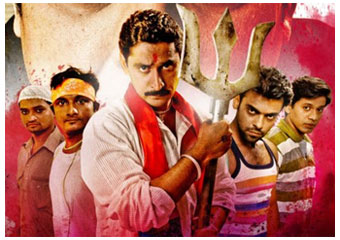
In the role of Shankar Gawde, Chinmay Mandlekar perfectly fits into that character, which is developed by himself, through the script. He is the new angry young man of Marathi films, walking on the footsteps of Nana Patekar. Watch him taking the revenge in the climax and you will start believing his ability. Murali Sharma poses a challenge to all those villains in Marathi film industry. After his appearance in ‘Ajintha’ and ‘ Hello Jai Hind!’, he seems to have worked very hard on his diction in marathi. He plays a cunning politician in his own style to impress one and all. Don’t be surprised, if he is nominated as an actor in negative role in forthcoming popular awards.
Namrata Gaikwad has limited scope; but she has played her part well, especially in emotion filled sequences. Ganesh Yadav in the role of a TV journalist does a fine job. Among the supporting cast, Veteran Janardan Parab, versatile Amita Khopkar, Kedar Shinde and other young artistes have played their parts very well. Debutant Amitraj has offered good music on meaningful lyrics by team of Guru Thakur, Sachin Darekar, Rupesh and Ashish. Imran and Faisal Mahadik have done a skillful editing work. Last but not the least, Cinematographer and director Rahul Jadhav in his dual role, has used his creativity in presenting some of the sequences, creating the desired impact. Though this film is based on same old Political theme, the presentation part is good.
‘Chirgut’ revolts against the corrupt system
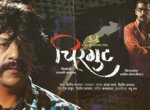 |
Rating: na
Banner: J. R. D. Entertainment Producer: Rajshree Jagtap Director: Pradeep Ghonsikar Story: Dilip Jagtap Screenplay- Dialogues: Sanjay Pawar, Dilip Jagtap Cinematographer: Madhu Rao Cast: Upendra Limaye, Chinmay Mandlekar, Siya Patil, Madhav Abhyankar, Sanjay Kulkarni, Pramod Shinde, Dr. Sharad Bhutadia and Ajit Bhagat Movie Review by: Ulhas Shirke |
Corruption is spreading like a cancer in the society and the main victims are the laborers and the neglected class, who live in the slums. Today, under the name of ‘Slum Rehabilitation Projects’ the builders with the help of local leaders, are exploiting the slum dwellers. The latest Marathi film ‘Chirgut’, (which means a worn out cloth piece) has been shot on the backdrop of a real existing slum off. Mumbai, where you find the concentration of people belonging to the most neglected community including Eunuch and prostitutes. The hero of this film Nagya (Upendra Limaye) an orphan, has been brought up by one such Eunuch (Ajit Bhagat).
The film has a hard hitting subject with Nagya educating the people from his slum colony, about their rights. He also dares to challenge the local MLA, when the latter approaches him with an offer. Watching Nagya’s stand against the corrupt system, Jahnavi ( Siya Patil) a student of Sociology from a Management Institute, is highly impressed. She talks to her close friend and project partner Vijya (Chinmay Mandlekar) about Nagya’s mission; but, he discourages her, saying that he had closely observed Nagya since his college days and that he would not be able to carry forward his fight. But, Jahnavi takes her own decision and leaves her college project to join Nagya’s movement. She is also joined by other two friends. Finally, when Vijya realizes that his professor is also working on the directions of the Government, he too joins their group.
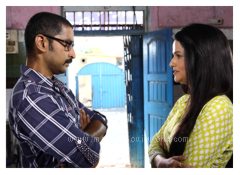
Their movement spreads to other parts of Maharashtra, where people exploited by politicians and builders unite under their leadership. As a result of this, the chief Minister, a look alike of the present chief Minister of Maharashtra, orders inquiry against
some of his team members and bows down before the demand of the revolutionaries. The film has hard hitting dialogues by Sanjay Pawar and Dilip Jagtap, to create the conflict between Policy makers and slum dwellers.
The film did possess the content to expose the system, but it failed in the concluding part. The reason for which Nagya opens his fight, i.e. to hand over the rights to the people actually leaving in the slums, to develop their area; does not produce desired results in the end. It would have been better, if the director had concluded the film, showing the Slum rehabilitation rights given to Nagya and his associates. It would have sent a strong message to our policy makers and selfish politicians, who play hand n glove game with builders.
The film has clearly shown the MLA of ruling party and the opposition leader coming together, fearing about the sudden rise of such third front led by Nagya. In fact, the film has been targeted at such underprivileged people living in slums, reminding them about their rights. It also inspires them to form their own front, to seek their privileges. National award winning actor Upendra Limaye has given his best in the role of Nagya, which is almost a one man show. In the supporting cast Chinmay Mandlekar and Siya Patil find few scenes to make their presence felt. Other artistes like Madhav Abhyankar as the Professor, Dr. Sharad Bhutadia as opposition leader, Ajit Bhagat as Eunuch and Pramod Shinde as chief Minister have done well. Pradeep Ghonsikar’s direction is good in some of the important scenes but in the climax, he fails to create that desired impact, as the last scene has been dragged with the speech of Nagya. However, the sincere effort of the director to present this social issue in a cinematic format, is to be appreciated.
‘Moraya’ hints at festivals as political events
2.5
|
 |
Presentor: Everest Entertainment Pvt. Ltd, A Square Entertainment,
Ekvira Productios Pvt. Ltd Producer: Atul Kamble, Avadhoot Gupte Director: Avadhoot Gupte Story: Sachin Darekar Music: Avadhut Gupte Camera: Rahul Jadhav Cast: Santosh Juvekar, Chinmay Mandlekar, Dilip Prabhavalkar, Ganesh Yadav, Janardan Parab, Pushkar Kshotri, Vijay NIkam, Sunil Godse, Sunil Ranade, Vimal Mhatre, Meghana Erande, Pari Telang, Spruha Joshi, Dhanashree Kodegaonkar Movie Review by: Ulhas Shirke |
Social activist Anna Hazare is fighting against corruption in the country. While he is demanding introduction of Janalokpal Bill to bring all political leaders including the Prime Minister answerable to Lokpal; film maker Avadhoot Gupte has tried to uncover the corruption taking place during the biggest festival events in our state.
Through his latest film ‘Morya’, Avadhoot has clearly shown how the youngsters organising the Govinda and Ganapati festivals fall into the trap of political leaders, getting tempted to their sponsorship, while competing with other organisers. Having tried his hands in direction for the first time with ‘Zenda’ his debut film, Avadhoot seems to have gained considerable experience; and this is evident from his latest film ‘Moraya’. He has picked up the right script penned by Sachin Darekar to make this timely film.
The theme of the film is on the backdrop of Govinda and Ganapati community festivals in Mumbai. ‘Moraya’ is based on the rivalry between two groups living in the same area and organising separate community festivals representing Ganesh Chawl Mandal and Khatav Chawl Mandal respectively . So, you find two groups of youngsters led by Manya (Santosh Juvekar) and Sameer (Chinmay Mandlekar) leading their respective mandals. When the redevelopment of the entire area is in the process and knowing that from next year onwards they will have to celebrate a combined community festival; they are suggested to come together. But, that does not happen, as both of them are adamant.
Hotelier Kamat (Dilip Prabhavalkar) who treats both Sameer and Manya like his own sons, also fails to bring them together. In the process both the teams are disqualified from attempting to break the Dahi handi in their area sponsored by a politician. So, Finally they decide to offer the claim of celebration of next year’s Ganesh festival to the Mandal, which attracts maximum number of devotees. The competition begins with raising the funds and in the process both the organisers fall into the trap of selfish politicians belonging to different political parties, who play their dirty game by making them fight with each other.
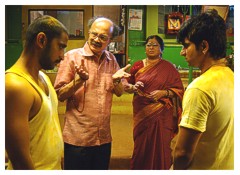
The film, however ends with predictable climax, clearly hinting at such festivals as
political events. It also goes on to show, how in the name of secularism and National integration, the politicians with the help of organisers try to fool the devotees. Through the character of Kamat, the film also sends across a strong message to the organisers of such festivals, as to how they are drifting from the values, by replacing stage plays and Bhajans with item numbers and loud music played by DJ’s. The film also poses few questions, whether the splendor with which such festivals are celebrated and crores of rupees spent, is justified in a state where thousands of farmers are committing suicides. And, whether the global warming genuinely considered during such festivals ?
Music plays an equally important role in this film and hence the director, who also composes the music has paid more attention by skillfully creating space for it, in the screenplay. Be it a Quauwali, a lavani, an item number or an arati ; he has used them at right places. Females don’t find much scope in this male dominated film, yet Spruha Joshi finds a better role while playing the girl friend of Santosh Juvekar. She plays a singer at a Bar. Pari Telang finds another important role of a TV Journalist, who develops a soft corner for Sameer, after she interviews him. Kranti Redkar and Urmila Kanetkar appear in guest roles as celebrity dancers. There are small but important roles coming to the share of Pushkar Shroti, Sunil Ranade, Meghana Erande and Sunil Godse, but it is the hotelier Kamat played by Dilip Prabhavalkar who lives an impression. Avadhoot himself with Subodh Bhave participate in Quawali as guest artistes. Ganesh Yadav has lot to say about the role of Police in a situation where gang riots take place. He is simply remarkable in that role of a Senior Police officer.
‘Moraya’ possesses that elegant look for its superb Cinematography by Rahul Jadhav, who also happens to be the Associate Director of this film. Editing work by Imran Mahadik and Faisal Mahadik is good. Sound design is appropriate to the situation. Screenplay is good and dialogues are well written especially in the second half. In the fist half however, there is lot of repetition in the dialogues, when Sameer and Manya face each other. It is only when at the stroke of interval, the director gives a twist, the confrontation gains momentum with series of dialogues.
‘Moraya’ is a cleverly presented film, with fabulous performances coming from both Chinmay and Santosh. It would be wise not to compare them with each other. Watch them in that last scene when the police officer played by Ganesh Yadav brings them together at an isolated place to voice their agony. With Govinda and Ganapati celebrations almost nearing, the film is likely to receive a good response.
